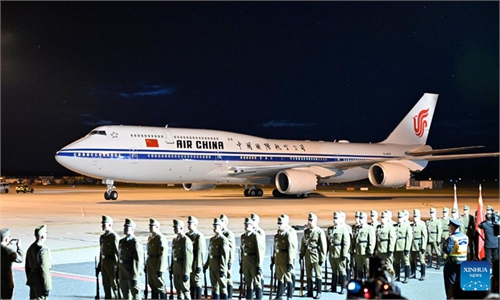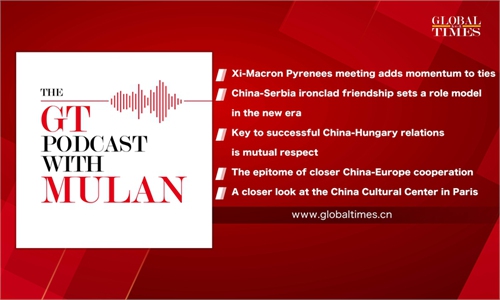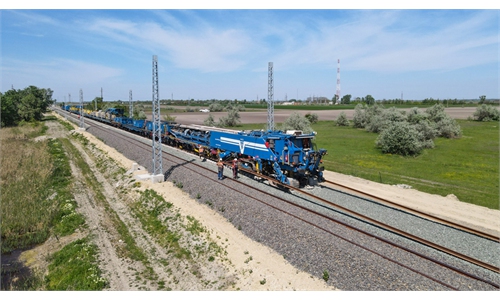
A view of Hungarian Parliament Building, Budapest. Photos: VCG
Editor's Note:
Hungary is the last stop of Chinese President Xi Jinping's ongoing Europe visit. This year marks the 75th anniversary of the establishment of China-Hungary diplomatic relations. What is the significance of Xi's visit to this Central and Eastern European country? Global Times (GT) reporters Wang Wenwen and Zhao Juecheng talked to Levente Horváth (Horváth), director of Eurasia Center of John von Neumann University and chief advisor to the governor of the Central Bank of Hungary, and Zoltan Kiszelly (Kiszelly), director for political analysis of the Budapest-based political think tank Szazadveg Foundation, about these issues.
GT: What do you think is the significance of President Xi's visit to Hungary? How will the trip elevate China-Hungary relations?
Horváth: In the Year of the Dragon, we celebrate the 75th anniversary of the establishment of diplomatic relations between Hungary and China. For the past 75 years, there has been a close relationship between the two countries. With the Hungarian "Opening to the East" policy in 2010, and the announcement of the China-initiated Belt and Road Initiative (BRI) in 2013 - which Hungary joined in 2015 - we can talk about ever closer economic relations: China has now become Hungary's largest trading partner outside of Europe, and 4 percent of the entire Hungarian trade comes from Chinese cooperation. In recent years, China has consistently been the first or second largest non-EU investor in Hungary, finishing first in 2023 too. Therefore, it is clear that Hungary-China relations are living their golden age, thus President Xi's visit to Hungary will be a worthy celebration of the 75th anniversary of diplomatic relations, and it is expected that the current comprehensive strategic partnership will rise to another level.
Kiszelly: Hungary is a medium-size EU member state, so the country feels honored to welcome President Xi on one of his three stops in Europe. This is not only to remember the fact that Hungary was one of the first countries to recognize the People's Republic of China in 1949, but that since then vice president Xi's visit to Hungary in 2009, China-Hungary relations have developed in a more than satisfactory way. The expectations in Budapest are high, and not only in the field of economy. The most urgent question of our time is to maintain connectivity between the West and China, not to "de-risk" or "decouple," and to provide mankind a shared future in prosperity, security and growth.
Hungary is a diving board for Chinese companies in Central and Eastern Europe, being a regional center for the Bank of China, Huawei Consumer Services and many more. The country was among the first to join the BRI with many ongoing development projects, like the Belgrade-Budapest railway. Electric vehicle (EV) manufacturing is a new dimension with BYD electric bus production already having a presence in the country, and EVs are coming to a new plant in the town of Szeged. The visit of President Xi can give momentum for more projects of common interest, like the extension of direct flights between China and Hungary, the fulfilment center for Chinese online shops for their European consumers and the development of environmentally friendly train transport via the Middle Corridor, having 17,000 train pairs in 2023.
GT: What do you think is the key to this successful bilateral relationship?
Horváth: We are witnessing the changing of the world order. The unipolar world order, dominated by the West until now, is transforming into a new kind of multipolar world order. As the West is afraid to lose its power, it started creating blocs, a new cold war thinking, on an ideological basis. However, we have learned from history that bloc-formation is not a good direction, but rather connectivity and peaceful cooperation based on mutual respect and mutual benefits can support the peaceful coexistence and development of countries.
The relationship between Hungary and China is getting closer and closer because they think similarly about international relations. And also because Hungary has a stable political and economic environment that is very important for long-term planning and cooperation.
GT: Why can Hungary remain steadfast in its approach toward China?
Horváth: As I mentioned, Hungary thinks about international relations in a similar way to China. Taking into account its national interests, Hungary maintains good relations with China and other Asian countries in addition to the West. It has diversified its relations in the spirit of the policy of "Opening to the East," thanks to which the Hungarian economy has benefited a lot.
However, it is also important to mention that, although the EU is critical of Hungary-China relations, EU member states are increasingly establishing economic relations with China, the second largest power in the world economy. German Chancellor Olaf Scholz visited China in April leading a business delegation; French President Emmanuel Macron also received the Chinese head of state in Paris on this occasion as well. In addition, the heads of government of Belgium and the Netherlands paid an official visit to China, and the prime minister of Italy is also planning a trip to China this year.
Kiszelly: Hungary is doing the same that Germany, France and other big Western economies did for decades, establishing mutual beneficial economic relations with one of the decisive poles of world economy - China. As Western European countries change their attitude toward China, Hungary sticks to this success model, and maintains connectivity, and opposes "de-risking" or even "decoupling."
Hungary has faced much criticism and even political attacks and economic and political sanctions from allies for its China policy, but the Hungarian government is convinced that a model, having functioned for decades and being mutually beneficial, can be obtained in the future. Hungary is not isolated in this effort, as many Western manufacturing companies are interested in maintaining cooperation with Chinese companies.
The bureaucratic policy of the European Commission drives Europe into economic decline and recession. While the EU is turning more and more into a planned economy, China is promoting free trade and market economy. "De-risking" and "decoupling" are part of this disastrous and ideology-driven policy and as such it is opposed by the Hungarian government.
China-Hungary relations are a good example of a relationship of mutual respect and noninterference into the domestic affairs of the other partner. That is a solid base for a prospering relationship, sidelining ideological aspects and artificial barriers put into effect by third parties. Hungary is pursuing in the EU this policy of noninterference and mutual respect policy.
GT: What positive impact do you expect Xi's visit to bring to China-EU relations?
Kiszelly: In a more and more challenging world, it is best to talk to each other directly and to discuss the upcoming difficulties in person. The Europe visit of President Xi is a good opportunity to do this. France is a founding and big Western European member of the EU, while Hungary is a "new" and Eastern member state, and Serbia is a candidate country of the EU and the biggest country on the Western Balkans. The Chinese president and the leaders of these European countries will have the opportunity to discuss current issues in person.
The most positive impact can be seen in the dialogue and the chance to clear positions and settle misunderstandings on questions of bilateral interest, such as, for example, the state subsidies in key sectors (especially the automotive sector, energy and digital technologies). The leaders can focus on enhancing the mutual beneficial trade between our two poles of the world economy, adjusting the imbalances and encouraging investment.



